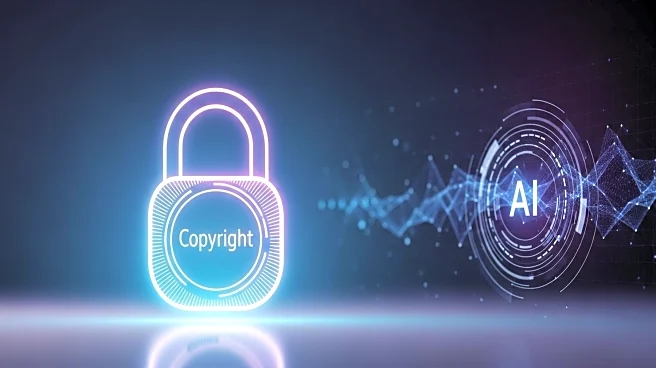What's Happening?
OpenAI has announced a revision to its copyright policy for the Sora 2 AI video generation model, following concerns about the use of copyrighted content. The model, launched on September 30, initially operated under an opt-out policy, allowing the use of copyrighted material unless creators explicitly requested otherwise. However, after backlash and legal concerns, OpenAI has shifted to an opt-in policy, requiring explicit permission from copyright holders before their content can be used. This change comes after videos generated by Sora 2 included characters from Japanese game and anime studios, such as Nintendo and Pokémon, without apparent restrictions. OpenAI CEO Sam Altman acknowledged the need for more granular control for rightsholders, emphasizing the value of interactive fan fiction while ensuring creators can specify how their characters are used.
Why It's Important?
The policy shift by OpenAI is significant as it addresses the legal and ethical challenges associated with AI-generated content. By moving to an opt-in model, OpenAI aims to mitigate potential copyright infringement issues, which could have led to lawsuits and strained relationships with content creators. This decision reflects the growing need for AI companies to navigate intellectual property rights carefully, especially as AI models become more sophisticated in generating realistic content. The change is likely to impact the creative industries, particularly in Japan, where there is a strong connection between users and local content. It also sets a precedent for other AI companies in handling copyrighted material, potentially influencing future policy decisions in the tech industry.
What's Next?
OpenAI's revised policy may prompt other AI companies to reevaluate their approaches to copyrighted content, potentially leading to industry-wide changes. Stakeholders, including content creators and legal experts, are likely to monitor the implementation of this policy closely to ensure compliance and protect intellectual property rights. Additionally, Japanese lawmakers, such as Akihisa Shiozaki, have called for further action to safeguard domestic creators, which could lead to legislative measures or industry guidelines. As AI technology continues to evolve, ongoing dialogue between tech companies and content creators will be crucial in balancing innovation with legal and ethical considerations.
Beyond the Headlines
The controversy surrounding OpenAI's Sora 2 model highlights broader ethical and cultural implications of AI-generated content. The ability to create realistic videos featuring copyrighted characters raises questions about the boundaries of creativity and ownership in the digital age. This development may influence cultural perceptions of AI and its role in the creative process, potentially leading to new forms of collaboration between AI developers and content creators. Furthermore, the situation underscores the importance of establishing clear guidelines and policies to navigate the complex landscape of AI and intellectual property.









